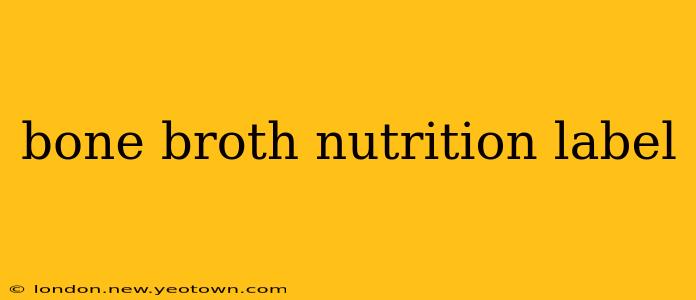Bone broth, that rich, savory liquid simmered for hours from bones and vegetables, has surged in popularity. But what exactly is in this culinary elixir? Let's unravel the mysteries of the bone broth nutrition label, exploring its nutritional composition and potential health benefits. Imagine this: you're peering into your fridge, a steaming mug of bone broth in hand, ready to understand the nutritional powerhouse you're about to consume.
This journey begins with understanding that a typical bone broth nutrition label will vary significantly depending on the ingredients used (beef, chicken, turkey, etc.), cooking methods, and whether additional vegetables or spices are added. However, certain core nutrients consistently shine through.
What are the main components of bone broth's nutritional profile?
A standard serving of bone broth (around 1 cup) typically boasts a surprisingly impressive nutritional profile. While calorie content is generally low, its true power lies in the concentration of essential nutrients. Think of it less as a meal replacement and more as a nutrient-dense supplement, adding value to your diet.
We'll break it down further:
Protein: A building block for muscles and tissues. The exact amount varies based on the bone source, but bone broth provides a notable amount of protein, contributing to satiety and overall health.
Amino Acids: The individual components of protein, some of which are considered essential (meaning your body can't produce them). Bone broth is a good source of glycine, proline, and glutamine – amino acids with potential benefits for gut health, joint support, and sleep.
Gelatin: A protein derived from collagen, the structural protein in bones and connective tissues. Gelatin contributes to the broth's characteristic texture and offers potential benefits for gut health and joint function.
Minerals: Bone broth is a surprisingly good source of several essential minerals, including calcium, magnesium, phosphorus, and potassium. These minerals play crucial roles in various bodily functions, from bone health to nerve function. The mineral content is heavily influenced by the type of bone used and the water source.
Electrolytes: Sodium, potassium, and other electrolytes found in bone broth are vital for maintaining proper hydration and fluid balance in the body. This is particularly helpful after intense exercise or during illness.
What are the potential health benefits of bone broth?
The purported health benefits of bone broth are many, fueling its current popularity. However, it’s crucial to note that much of the research is still in its early stages. More robust, large-scale studies are needed to confirm many of these claims.
Improved Gut Health: The gelatin and amino acids in bone broth are often touted for their potential to support gut health by promoting the growth of beneficial gut bacteria and reducing inflammation.
Joint Support: The presence of collagen and other components has led to claims that bone broth may improve joint health and reduce joint pain, particularly in individuals with osteoarthritis.
Improved Sleep: The amino acid glycine is believed to promote relaxation and improve sleep quality.
Stronger Immune System: Bone broth is rich in minerals and amino acids that are essential for a properly functioning immune system. While it doesn't magically cure illnesses, it contributes to overall immune health.
How does bone broth compare to other broths?
Bone broth differentiates itself from other broths (vegetable, chicken, etc.) primarily through its extended simmering time and focus on the bones themselves. This prolonged cooking process extracts a greater concentration of minerals and collagen, giving it a distinct nutritional profile. While other broths are valuable sources of nutrients, bone broth stands apart in its concentration of these particular components.
Is bone broth suitable for everyone?
While generally safe for consumption, bone broth may not be suitable for everyone. Individuals with certain dietary restrictions or medical conditions should consult their doctor before incorporating bone broth into their diet regularly. For example, those with gout or kidney stones might need to monitor their purine and electrolyte intake carefully. Also, store-bought bone broths may contain added sodium or other ingredients that affect its suitability.
This detailed exploration of the bone broth nutrition label underscores its potential as a nutrient-dense addition to a healthy diet. However, remember that it's a supplement, not a cure-all. Enjoy it as part of a balanced lifestyle, and always consult your doctor with any questions or concerns regarding your dietary choices.

